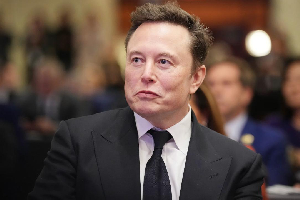By Kwame Okoampa-Ahoofe, Jr., Ph.D.
Since June 12, 2009, the Islamic “Republic” of Iran has been crudely grappling with the intricacies of the pursuit of the values of a just society and the democratic rule of law, with tens of protesters against the pseudo-religious, staged-managed presidential election that returned Mr. Mahmoud Ahmadinejad to power having been either summarily mowed down by the gun-barrel, during various stages of protest demonstrations, or imprisoned for simply daring to demand the democratic rule of law.
And so, naturally, it came to me as quite a surprise when, recently, I came across a brief news item captioned “Iranian Embassy to Support Education of Muslim Girls” (See Ghana News Agency/Ghanaweb.com 11/25/09). The purported “support,” which appeared to largely center around the Muslim community in Kumasi, Ghana’s unofficial second capital, was in the form of an 8-week public campaign aimed at “highlighting the importance of education to development.”
Needless to say, the surprise here regarded how it came about that the Atta-Mills government of the so-called National Democratic Congress (NDC) decided to curiously delegate its primary responsibility of educating all Ghanaian citizens, irrespective of creed and/or religious and ideological suasion, to a foreign government that is not, in any way, known to champion the equality of the genders in the unequivocal manner in which the same is championed in Ghana. And here also must be underscored the fact that the host country has a full-fledged and secular Ministry of Education that has, for generations, facilitated the sound academic and cultural development of hundreds of thousands of both Muslim and non-Muslim Ghanaian citizens alike.
Then also must be underscored the fact that Ghana’s Ministry of Education has, in the past, effectively collaborated with all the various religious denominations that sponsor educational institutions in the intellectual and cultural enrichment of Ghanaian citizens.
Anyway, by the time that you read this article (1/5/10), the Iranian support-campaign to boost the academic enrollment of Muslim girls in our schools would have already ended. If, indeed, there is a dramatic downturn in the enrollment and education of Ghanaian Muslim girls then, by all means, table this as a national problem for constructive debate and prompt redress in the Ghanaian parliament.
In sum, the grim reality of financial strictures, even at the national level, ought not to serve as a facile pretext for the unhealthy encouragement of any foreign government to, literally, bombard our children and future leadership generations with ideas and values that may not necessarily gibe with the direction in which Ghanaians want to carry our sovereign nation.
What singularly piqued my curiosity, however, was the name of an Alhaji Mohammed Yushau, the reported coordinator of the Iranian-led academic campaign. A googling of Mr. Yushau’s name brought home some quite interesting revelations, including the fact of the latter being a board member of an institution called Watania Islamic School and located at Aboabo Number One, near the Aboabo Market in Kumasi. A casual perusal of the Watania curriculum, as published on the school’s website, indicated its Arabo-Islamic bent. But that was only the surface of the problem; a history of the school and its founder insisted, perhaps out of sheer arrogance, on the latter being a northern Nigerian indigene of Sokoto origins, even though visitors to the website are also informed that the founder’s parents permanently settled in Ghana as far back as 1913. In other words, what we have here is a group of Islamic ideologues who insist on both eating their proverbial cake and, simultaneously, retaining the same.
We highlight the preceding because recent ideologically adversarial proclivities brazenly exhibited at the polls by denizens of the Asewases and Aboabos of Ghana, primarily and deviously instigated by Mr. Rawlings’ “politics of envy,” by the way, may likely come to haunt the hospitable hosts. In other words, rather than envisage these Islamic communities as auspiciously complementary and organically integral to the host and/or majority culture, increasingly, we see these “alien” Islamic communities (with their ideological “herd mentality”) becoming more like strategic beachheads than constructive collaborators who share a common cause with their host communities.
In the end, it becomes grossly demeaning and blighting of Ghanaian democracy and sovereignty, if after a half-century of self-governance, it has to take the Islamic “Republic” of Iran to put our children into schools. According to Watania’s Alhaji Mohammed Yushau, the local agent/facilitator of the Iranian campaign, “sending our children to school could help them to have a better understanding of the history and ethics of Islam.” I am afraid there is far, far more to a sound education than such patently parochial indoctrination. Needless to say, the best education is one that systematically induces a spirit and attitude of open-mindedness, even while also professionally preparing the trainee for the salutary pursuit of a meaningful existence. And to best realize the latter, Ghanaian Muslim scholars and educators –not those of Iran – need to seriously collaborate with Ghana’s Ministry of Education. Iran can help with cash and other logistical assistance. This is what, indeed, “support” means, not the sort of jihadist campaign adumbrated by the Ghana News Agency (GNA).
*Kwame Okoampa-Ahoofe, Jr., Ph.D., is Associate Professor of English, Journalism and Creative Writing at Nassau Community College of the State University of New York, Garden City. He is a Governing Board Member of the Accra-based Danquah Institute (DI), the pro-democracy think tank, and the author of 21 books. E-mail: okoampaahoofe@aol.com. ###
Opinions of Thursday, 7 January 2010
Columnist: Okoampa-Ahoofe, Kwame
When the Ayatollah Educates Ghanaian Kids
Opinions













